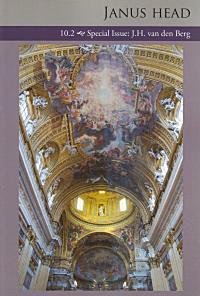 Janus Head Janus Head
10.2
Special Issue
J.H. van den Berg

Travels Inside the Archive
Robert Gibbons
Edge of Maine Editions

Beyond Time
New & Selected Work
1977 - 2007
Robert Gibbons
 The Age of Briggs & Stratton The Age of Briggs & Stratton
Peter Culley
|
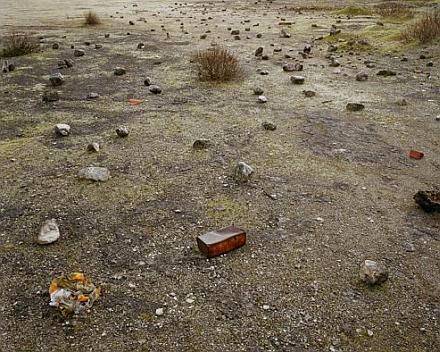
Thermopylae 480BC
The Phocian Wall
The Course of History
Bart Michiels
1 2
_______________________
A Wave of Dreams
Louis Aragon
(translated from the French by Adam Cornford)
duration press
I happen, suddenly, to lose the whole thread of my life: I ask myself, sitting in some corner of the universe, by a smoky dark café, in front of polished bits of metal, amid the comings and goings of large sweet-tempered women, by what road of madness I end up stranded under this arch, which is actually the bridge they call the sky. That moment when everything gets away from me, when huge cracks force their way to light in the palace of the world-I would sacrifice my whole life for it, if it would just consent to persist at such a laughable price. Then, the mind detaches itself a bit from the human mechanism; then, I am no longer the bicycle of my senses, the grindstone for sharpening memories and meetings. Then, I grasp the occasional in myself, I grasp all at once how I surpass myself: the occasional, c'est moi; and having formed this proposition I laugh at the memory of all human activity. At this point, no doubt, there would be some grandeur in dying; at this point no doubt they kill themselves, the people who one day depart with clear eyes. At this point, anyway, begins thought, which is not at all that looking-glass game where quite a few excel, without danger. If one has tried this vertigo, be it only once, it seems impossible to go on accepting the mechanical ideas that today sum up nearly all Man's endeavors, and all his peace of mind. At the bottom of the seemingly purest speculation, one catches sight of an unexamined axiom that escaped criticism, that was attached to some other, forgotten system: one which is no longer on trial but which leaves this rut in the mind, this formula that is not discussed. Thus the philosophers talk in proverbs and demonstrations. They chain up their imaginations in these foreign links, stolen from famous tombs. They think truth has sides, they believe in partial truths.
I lived in the shadow of a great white edifice adorned with flags and outcries. I was not allowed to withdraw from this mansion Society, and those who climbed its front steps made a frightful cloud of dust on the doormat. Patriotism, honor, religion, goodness-it was hard to recognize oneself amidst these countless words that they tossed out at random to the echoes. Still, I slowly disentangled their firmest beliefs. These amounted to very little. "The tendency of all being to persist in its being" is one of their favorite formulas, while hedonism seems quite discredited in their eyes. For them, the pejorative expression "tainted with finalist" suffices to condemn absolutely anything. Lastly, they open the paragraphs of their intellectual life with a phrase that pleases them: "Let us part the veil of words for a moment." That such methods draw them into taking hypotheses for realities, and a posteriori hypotheses at that, they never so much as suspect. Their minds are monstrous hybrids, offspring of the peculiar amours of the oyster and the buzzard. But these hunchbacks of thought have not the least fear that passers-by will superstitiously brush a hand over their deformity for good luck. They are kings of the world and gaolers of the dungeon from which I can hear their cheerful singing and the noise of the keys they brandish. (....)
Now and then, if some visitor inquired in passing about how I passed the time in the seclusion in which, it was said without irony, I confined myself-if someone, not too sure whether to doubt me or himself, had access for a moment to my unwonted existence, my responses would quickly bring to his eyes the China-vase gleam of disbelief. How could he accept that I don't pursue happiness at all? That there is no thought but in words? And yet sometimes, this visitor, carried along by fashion and belief in the strength of a doctrine, would invoke idealism. Then I would begin to understand that once again I had before me a shamefaced realist, one of today's men of good will who live on a compromise between Kant and Comte, who think they have taken a big step by rejecting the vulgar idea of reality in favor of reality-in-itself, the noumenon, that shabby, paint-peeled plaster figurine....(more)
durationpress.com - international poetry
_______________________
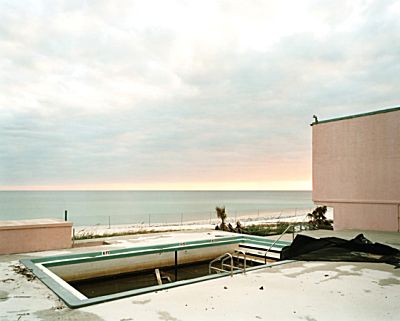
no lifeguard on duty
J.Bennett Fitts
_______________________
My 1933 Nightmare
David Michael Green
It's not so much, I guess, the visage of obese, over-fifty, white men angrily wrecking even the tattered remnants of the democratic process in this country that is most disturbing. We've seen that before.
I think it's the willful ignorance translated into incoherent, and in fact ironically self-defeating, rage that I find most discouraging. Can we really live in a country populated by so many fools, people who can so readily, proudly and belligerently be made into tools of their own destruction? Can the greatest political, economic, cultural and military power on the world's stage possibly be so incredibly backward at its core?(....)
But what seems to me new about this moment is the political road rage, the thuggishness of masses of Americans who not only are venting about insane nonsense, not only are undermining their own interests acting as marionettes of laughing corporate predators, and not only are taking down democracy around themselves in order to do so, but are in fact also destroying the entire Enlightenment project of rationality-based management of public affairs as well. The single most frightening characteristic of this movement, to my mind, is that fact that no amount of evidence or logic could persuade these folks to abandon the lies they've attached themselves to, like a pit bull clamped to the leg of some poor SOB's pants.
What does it take to get someone to the point that they believe that the US Congress is passing a healthcare reform bill that will allow the government to exterminate seniors? What does it take for them to impute that motive to a president from the feeble Democratic Party? And, at that, one of the most Milquetoastian creatures to hit Washington since Hubert Humphrey ran for president acting like he was a guy named Hubert Humphrey? From Minnesota, no less.
What do you have to do to humans to get them so stupefied that they believe Obama's Hawaiian birth was some sort of conspiracy, replete with fake 1961 newspaper announcements? What sort of powerful drugs does one have to be on to make the argument that this rather considerably conservative president is a socialist? And then to call him a fascist in your next breath, blissfully unaware that the chasm separating the two ideologies not only makes them wholly different, but, indeed, oppositional. (You know, like in World War II. Maybe they've even heard of that.)
In fact, this is not a matter of stupidity, though there's loads of that to go around. But I bet that when it comes to finding arcane deductions to insert into their tax forms, these folks are actually quite clever. I bet a lot of them could reel off sports statistics or bible verses that would put your head in a fog. No, it's not stupidity. Something else is going on here....(more)
_______________________
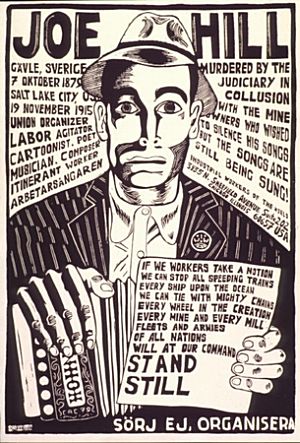
Carlos Cortez
(August 13, 1923 – January 19, 2005)
An Interview With Carlos Cortez
drawing resistance
80 Years of Rebel Art
Slides of an IWW art show that was exhibited across the country in the late 80s.
youtube
_______________________
Inside Story on Town Hall Riots:
Right-Wing Shock Troops Do Corporate America's Dirty Work
Adele M. Stan
How the health-care industry, the GOP and one media mogul made common cause with the anti-government fringe.
_______________________
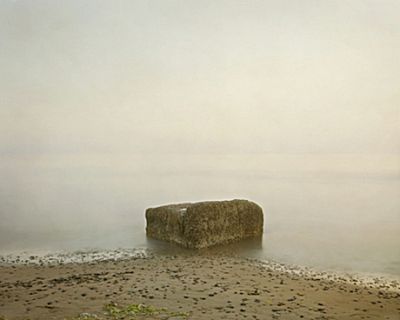
Omaha Beach
Bart Michiels

Hidden Life of Masks
Valery Tumbayev Sheremey's Gallery
Russian Gallery of Photography and Painting
_______________________
Medusa
Louise Bogan
I had come to the house, in a cave of trees,
Facing a sheer sky.
Everything moved,—a bell hung ready to strike,
Sun and reflection wheeled by.
When the bare eyes were before me
And the hissing hair,
Held up at a window, seen through a door.
The stiff bald eyes, the serpents on the forehead
Formed in the air.
This is a dead scene forever now.
Nothing will ever stir.
The end will never brighten it more than this,
Nor the rain blur.
The water will always fall, and will not fall,
And the tipped bell make no sound.
The grass will always be growing for hay
Deep on the ground.
And I shall stand here like a shadow
Under the great balanced day,
My eyes on the yellow dust, that was lifting in the wind,
And does not drift away.

Louise Bogan
(August 11, 1897 – February 4, 1970)
by LaVerne Harrell Clark
1 2
Louise Bogan and the Pleasures of Formal Poetry
Dena L. Moore
The veiled mirror and the woman poet
Elizabeth Caroline Dodd on H.D., Louise Bogan, Elizabeth Bishop and Louise Gluck
google books
.....................................................
“Under the subtle wreath”:
Louise Bogan, Felicia Hemans, and Petrarchan Poetics
Nanora Sweet
The Transatlantic Poetess
Romanticism on the Net
Numéro 29-30, February-May 2003
_______________________
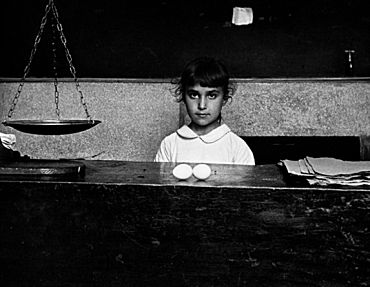
Piergiorgio Branzi
_______________________
The Alchemist
Louise Bogan
I burned my life, that I may find
A passion wholly of the mind,
Thought divorced from eye and bone
Ecstasy come to breath alone.
I broke my life, to seek relief
From the flawed light of love and grief.
With mounting beat the utter fire
Charred existence and desire.
It died low, ceased its sudden thresh.
I had found unmysterious flesh--
Not the mind's avid substance--still
Passionate beyond the will.
_______________________
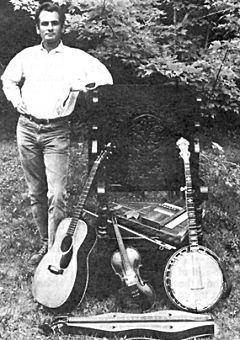
Mike Seeger
(August 15, 1933 – August 7, 2009)
co-founder of the New Lost City Ramblers
You can hear him on autoharp on the Plant/Krauss album Raising Sand.
Merlin in Rags provides a link to Mike Seeger's Tipple, Loom & Rail: Songs of the Industrialization of the South (1965) Music of the Southern Appalachian Mountains
A Study Guide
Mike Seeger
_______________________
Communism, the Word
Jean-Luc Nancy
Notes for the London Conference
Birbeck College
... communism says more and says something else than a political meaning. It says something about property. Property is not only the possession of goods. It is precisely beyond (and/or behind) any juridical assumption of a possession. It is what makes any kind of possession properly the possession of a subject, that is properly an expression of it. Property is not my possession: it is me.
But me, I, never exists alone. It exists essentially with other existing beings. The with is no external link, it is no link at all : it is togetherness - relation, sharing, exchange, mediation and immediation, meaning and feeling. The with has nothing to do with what is called collective. Collectivity means collected people : that is, people taken together from anywhere to the nowhere of the collectivity or of the collection. The co- of collective is not the same as that of communism. This is not only a matter of etymology (munire versus ligare) . This is a matter of ontology : the co- of collectivism is a mere external “side by side” which implies no relationship between the sides or between the parts of this “partes extra partes”....(more) via Laura Carter (post-dérives)
_______________________
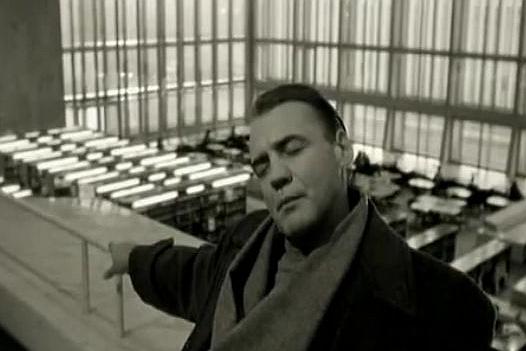
library
wings of desire
_______________________
Text Archive at the Internet Archive - over 1.57 million full text books and adding 1000 titles a day.
Via ResourceShelf
_______________________
“the law, in its majestic equality, forbids the rich as well as the poor to sleep under bridges.”
- Anatole France
Is It Now a Crime to Be Poor?Barbara Ehrenreich
In defiance of all reason and compassion, the criminalization of poverty has actually been intensifying as the recession generates ever more poverty. So concludes a new study from the National Law Center on Homelessness and Poverty, which found that the number of ordinances against the publicly poor has been rising since 2006......(more)
_______________________
Selections from the Prison Notebooks
Antonio Gramsci
edited and translated by Quintin Hoare and Geoffrey Nowell Smith
pdf here
If it is true that man cannot be conceived of except as historically determined man-i.e. man who has developed, and who lives, in certain conditions, in a particular social complex or totality of social relations-is it then possible to take sociology as meaning simply the study of these conditions and the laws which regulate their development ? Since the will and initiative of men themselves cannot be left out of account, this notion must be false. The problem of what "science" itself is has to be posed. Is not science itself "political activity" and political thought, in as much as it transforms men, and makes them different from what they were before ? If everything is "politics", then it is necessary-in order to avoid lapsing into a wearisome and tautological catalogue of platitudesto distinguish by means of new concepts between on the one hand the politics which corresponds to that science which is traditionally called "philosophy", and on the other the politics which is called political science in the strict sense. If science is the "discovery" of formerly unknown reality, is this reality not conceived of in a certain sense as transcendent ? And is it not thought that there still exists something "unknown" and hence transcendent ? And does the concept of science as "creation" not then mean that it too is "politics" ? Everything depends on seeing whether the creation involved is "arbitrary", or whether it is rational-i.e. "useful" to men in that it enlarges their concept of life, and raises to a higher level (develops) life itself. _______________________
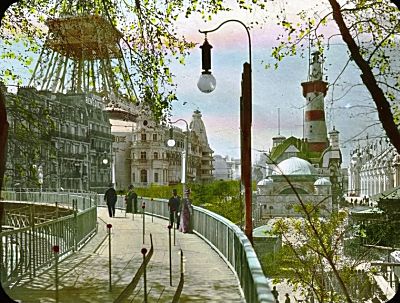
1900 Exposition Universelle
Brooklyn Museum
How the moving walkway nearly overtook the Metro
Paul Collins
new scientist
Moving sidewalk
Paris Expo 1900
Edison
youtube
_______________________
Carmen Perpetuum
Robin Blaser’s Continuous Song
Matthew Gagnon
jacket
“Perhaps the poetic condition is a matter of interrogation.”
2
The work of Robin Blaser stands as one of our most various and critical readings of our human condition. In our twentieth-first century political misgivings, a deficit of democratic values, and the 24-hour cable news playing in an endless loop, our image is repeatedly flashed back to us as if from outer-space. What should be apparent in the flexing and contortions of our image, is a further simplified appraisal of socio-political and cultural locations pushed to the edge of the poll’s number game, forever disembodying any real dialogue between the individual and collective.
3
Blaser’s self-reflexive writing practices find him on the interstices of a labor that attempts to reposition his network of learning to include a wide margin of sources by which to induct an act of thought. The resonances of this action resemble an ongoing conversation with tradition and maverick tendencies. Indeed, Blaser substantiates his work through the compositional difficulty of building one image on top of another. The affect is enlivening. The challenge is in reading Blaser not as the signatory of uninterrupted authorship, but as informed by a multiplicity of tongues, a cacophony of voices disturbing the distributed sequence of images handed to us as if from a platter.
...(more)
_______________________

Josef Koudelka
_______________________
Evening in the Sanitarium
Louise Bogan
The free evening fades, outside the windows fastened with decorative iron grilles.
The lamps are lighted; the shades drawn; the nurses are watching a little.
It is the hour of the complicated knitting on the safe bone needles; of the games of anagrams and bridge;
The deadly game of chess; the book held up like a mask.
The period of the wildest weeping, the fiercest delusion, is over.
The women rest their tired half-healed hearts; they are almost well.
Some of them will stay almost well always: the blunt-faced woman whose thinking dissolved
Under academic discipline; the manic-depressive girl
Now leveling off; one paranoiac afflicted with jealousy.
Another with persecution. Some alleviation has been possible.
O fortunate bride, who never again will become elated after childbirth!
O lucky older wife, who has been cured of feeling unwanted!
To the suburban railway station you will return, return,
To meet forever Jim home on the 5:35.
You will be again as normal and selfish and heartless as anybody else.
There is life left: the piano says it with its octave smile.
The soft carpets pad the thump and splinter of the suicide to be.
Everything will be splendid: the grandmother will not drink habitually.
The fruit salad will bloom on the plate like a bouquet
And the garden produce the blue-ribbon aquilegia.
_______________________

Piergiorgio Branzi
_______________________
from
Thinking About Louise Bogan
Kathleen Norris
agni
(....)
In this, our city,
a woman might find
good quality of night.
And in our spidery house
where ghosts sit crying
in front of mirrors,
Orion might bend
and hearts love
more fiercely.
Our prayer would read:
give us this day
our daily darkness;
deliver us not
from temptation.
...(more)
_______________________
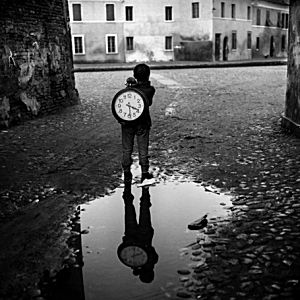
Piergiorgio Branzi
_______________________
Knowledge
Louise Bogan
Now that I know
How passion warms little
Of flesh in the mould,
And treasure is brittle,--
I'll lie here and learn
How, over their ground
Trees make a long shadow
And a light sound.
-
from Body of this Death: Poems (1923)

Arguments
Tom Bendtsen via Eric Baker's collection of book art installations
Observatory: Design Observer
_______________________
“You Are Sometimes in the Trance of What Is Beyond You”:
Upheaval, Incantation and Ed Dorn in the Summer of 1968
Kyle Waugh
jacket
For the lovesick Dorn and Dunbar, it was, after all, still Paris, “City of Light,” even if it was on fire. And even if the world were a wasteland — “really, the world is shit / and I mean all of it,” Dorn writes in the Love Songs — it was spring, love was like a song flitting over the burning trash: April in Paris, this is a feeling / no one can ever reprise. The fury that spring in Paris, and all over the world, seemed to externalize the wild frictions between the intensity of the couple’s exilic commitment to one another and the necessarily clandestine nature of their Paris trip, and then explode in their subsequent “embarrassment” at its exposure. “[I]t is to test that steel / across the plain between us,” that love grows in a time of war, sowing its own strife: “The agony is beauty / that you can’t have that / and sense too.” Thinking of Paris, thinking of Kansas (wherefrom, as a poet-in-residence at the university in Lawrence, he’d recently returned), thinking of intercontinental travel: “I just can’t imagine how bucolic life was then, I mean in my memory,” Dorn reminisced. “If you went to the Sorbonne, which we did, and, you know, saw the situationistes spilling over the balconies and explaining the L.A. riots, it all made some kind of sense. It was beautifully intellectual and feasible and containable, embraceable … and now it’s so cheap, you couldn’t give it away.”...(more)
_______________________
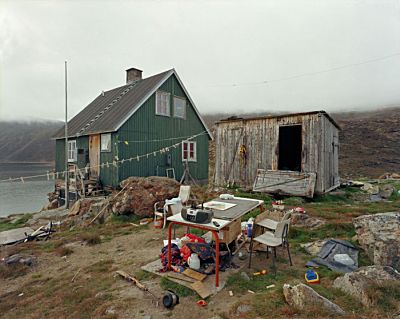
Olaf Otto Becker Broken Line
Olaf Otto Becker
The Book Depository
_______________________
In(ter)ventions — Literary Practice At The Edge: A Gathering
Program dates: February 18, 2010 - February 21, 2010
The Banff Centre
Director: Steven Ross Smith
Presenters: Caroline Bergvall, Charles Bernstein, Jen Bervin, Christian Bök, J.R. Carpenter, Ram Devineni, Craig Dworkin, Al Filreis, Kathleen Fraser, Christopher Funkhouser, Kenneth Goldsmith, Aya Karpinska, D. Kimm, Daphne Marlatt, Nick Monfort, Erin Mouré, Lance Olsen, Stephen Osborne, Marjorie Perloff, Stephanie Strickland, Steve Tomasula, Fred Wah
In(ter)ventions — Literary Practice At The Edge: A Gathering is a conference unlike any held previously in Canada. Over the course of three days, more than two dozen presenters and performers will create a context for the demonstration and discussion of cutting-edge literary practice. In a mixture of panels, papers, readings, performances, and more, participants will explore digital literature, interactivity, collaboration, cross-disciplinary work, formal innovation, “uncreative” writing, new modes of dissemination, and literary pedagogy....(more)
_______________________
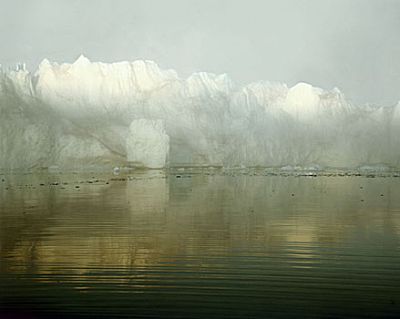
Greenland
Olaf Otto Becker
1 2
A Conversation with Olaf Otto Becker
Joerg Colberg _______________________
Openned - Where to Start
Contemporary poetic practice in Britain is difficult to define - there is no adequate terminology to describe it, and even the word 'contemporary' is fraught with paradox. The best way to understand it is to explore it, so below is a list of recommended online presences which newcomers can use to gain a better understanding of what Openned is all about.
_______________________
Open Humanities Press
"Making scholarly work available without charge on the internet has offered hope for the natural sciences and now offers hope in the humanities."
-
Stephen Greenblatt, Harvard University
_______________________

Library, sports club
Kolwezi, DR Congo
Avenue Patrice Lumumba
Guy Tillim
_______________________
From All About My Grandmother
Silvia Ballestra
Translated from the Italian by Anne Milano Appel
Words Without Borders: August 2005
Nonna has always invented words, Mama does too, and so do I.
Nonna invented nicknames and, by rebaptizing certain individuals, ennobled them in my eyes, making them into figures of distinction. Nonna has jumbled together the words of all the places she has known. They aren’t worldly words—she never traveled much—but words of the Marches, and they were enough for her. More than enough, so that Mama too, and I as well, still feel her words on the tip of our tongues. They are words that are precious to us, gentle remedies and treatments to be used skillfully for seasonal ailments, and recipes for good things to eat that are pleasurable to cook and make you memorable to your friends. They are words you take with you along with the household gods, though they aren’t heavy like trunks full of linen sets and silverware. They are reserves of expressions, light as air yet stronger than weapons, convenient for defending yourself and asserting your worth, and on occasion they can actually wound. There is some trace of Latin in them, it's their spirit I would say, it's their core, the nugget of their soul, and then they wear all sorts of garments, at times humble, at times grand, at times known to all and immediately comprehensible, at times made up out of whole cloth....(more)
_______________________

Court records
Lubumbashi, DR Congo
Guy Tillim
2007
_______________________
A Grammar of the Multitude
For an Analysis of Contemporary Forms of Life
Paulo Virno
Foreword by Sylvère Lotringer
Translated from the Italian
Isabella Bertoletti
James Cascaito
Andrea Casson
SEMIOTEXT(E)
How has the multitude survived the creation of the centralized States? Through what concealed and feeble forms has it made itself known after the full affirmation of the modern concept of sovereignty? Where is its echo heard? Stylizing the question to the extreme, let us try to identify the ways in which the many, seen as being many, have been understood in liberal thought and in democratic-socialist thought (thus, in political traditions which have had their indisputable point of reference in the unity of the people).
In liberal thought, the uneasiness provoked by the "many" is toned down by means of having recourse to the pairing of the terms public-private. The multitude, which is the polar opposite of the people, takes on the slightly ghostly and mortifying features of the so-called private. Incidentally, even the public-private dyad itself, before becoming something indisputable, had been forged through tears and blood during a thousand theoretical and practical disputes; it is maintained, therefore, by a complex set of consequences. What could be more normal for us than to speak of public experience and of private experience? But this bifurcation was not always taken for granted. The lack of indisputability is interesting because, today, we are perhaps living in a new seventeenth century, or in an age in which the old categories are falling apart and we need to coin new ones. Many concepts which still seem extravagant and unusual to us — the notion of non-representative democracy, for example — are perhaps already tending to drum up a new kind of common sense, in order to aspire, in turn, to become "obvious." But let us return to the point. "Private" signifies not only something personal, not only something which concerns the inner life of this person or that; private signifies, above all, deprived of: deprived of a voice, deprived of a public presence. In liberal thought, the multitude survives as a private dimension. The many are aphasic and far removed from the sphere of common affairs. In democratic-socialist thought, where is it that we find an echo of the archaic multitude?...(more)
Interview with Paolo Virno
The decisive experience of my youth was the revolutionary
struggle in a developed capitalist country. I insist: developed. A country, that
is, in which physical survival was guaranteed, consumption relatively high,
with by that time widespread scholastic instruction. I did not participate in
an uprising against misery or dictatorship but in a radical conflict aiming at
abolishing that modern form of barbarism: wage labor. We were not “thirdworldist”
but “Americanist.” Fighting at Fiat of Turin, we were thinking of
Detroit, not Cuba or Algiers. ...(more)
Ten Theses on the Multitude and Post-Fordist Capitalism 1 2
_______________________
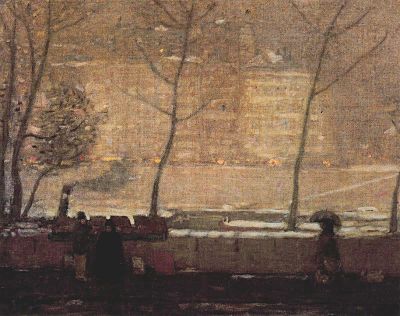
Quai des Grans-Augustins
James Wilson Morrice
b. Montreal, August 10, 1865
_______________________
A Sentence About Tyranny
Gyula Illyés
Translated by George Szirtes
here tyranny exists
that tyranny exists
not only in the barrel of the gun
not only in the cells of a prison
not just in the interrogation block
or the small hours of the clock
the guard's bark and his fists
the tyranny exists
not just in the billowing black fetor
of the closing speech of the prosecutor,
in the "justified use of force"
the prisoners' dull morse
(...)
tyranny supplies
the standing ovation, the loud
hurrahs and chanting of the crowd
at the conference, the songs
of tyranny, the breasts
that tyranny infests,
the loud unflagging
noise of rhythmic clapping,
(...)
there's tyranny in the nursery
in father's advice, in his guile,
in your mother's smile
in the child's answer
to the perfect stranger;
not just in wires with barbs and hooks
not just in rows of books,
but, worse than a barbed wire fence
the slogans devoid of sense
(...)
in tyranny's domain
you are the link in the chain,
you stink of him through and through,
the tyranny IS you;
like moles in sunlight we crawl
in pitch darkness, sprawl
and fidget in the closet
as if it were a desert,
because where tyranny obtains
everything is vain,
the song itself though fine
is false in every line,
for he stands over you
at your grave, and tells you who
you were, your every molecule
his to dispose and rule. ...
...(more)
A Few Words About a Single Sentence
The Story Behind an Illyés Poem
Mátyás Domokos The Hungarian Quarterly, XXXVI No. 139 Autumn 1995
_______________________
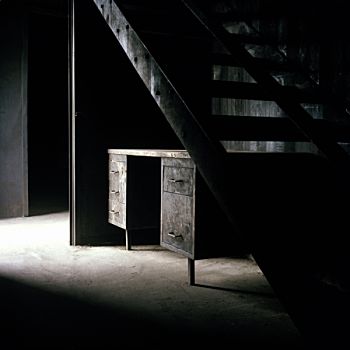
Samantha Goddard
Graduate Photography Online (2009)
SOURCE
via Jim Johnson
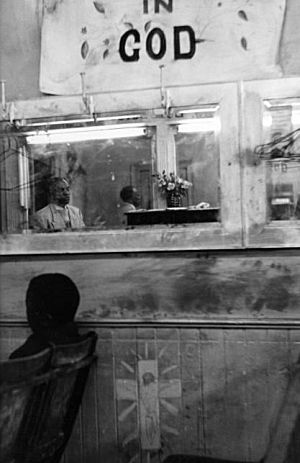
from Storefront Chronicles, 1958-1961
Milton Rogovin
Windows that Open Inward: Images of Chile
Milton Rogovin, Pablo Neruda
google books
Milton Rogovin Photograph Collection
loc
Milton Rogovin: An Activist Photographer
An Interview by Robert Hirsch
Afterimage, September 1, 2004
Milton Rogovin's "Approach": Photography, Class, and the Aesthetics of Making
Space [pdf]
Joseph Entin Clear vision: Milton Rogovin show "The Forgotten Ones"
Joanna Heatwole
Afterimage, March-April, 2004

Milton Rogovin
(born December 30, 1909)
Fred R. Conrad/The New York Times
Voices Silenced, Faces Preserved - Milton Rogovin
Randy Kennedy Working Class Hero via Jim Johnson
_______________________
What If History Happened To Someone Else
Could you live like this everyday???? Would you want your children to be treated in this way??? Would you be able to deal with tanks & a neighboring military roaming our streets at all times??? Could you ever look at your neighbor country as an ally or friend, if they treated you in this type of manner??? ...(more)
_______________________

photo - mw
_______________________
More Bubbles Waiting to Burst
Andrew Gavin Marshall
Global Research
While there is much talk of a recovery on the horizon, commentators are forgetting some crucial aspects of the financial crisis. The crisis is not simply composed of one bubble, the housing real estate bubble, which has already burst. The crisis has many bubbles, all of which dwarf the housing bubble burst of 2008. Indicators show that the next possible burst is the commercial real estate bubble. However, the main event on the horizon is the “bailout bubble” and the general world debt bubble, which will plunge the world into a Great Depression the likes of which have never before been seen. ...(more)
_______________________
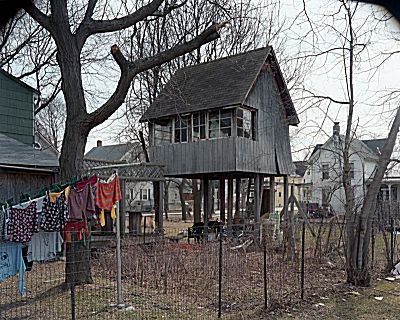
Yola Monakhov
via Joerg Colberg
_______________________
On Harmony
A Theory of Translation
Serge Gavronsky
drunken boat
... the translator is bound by an ethical commitment (a Kantian imperative, one might say); he or she is not gagged. Poetry, happily, complicates this question of transmissibility via an ethical stand for, in this particular domain, the pleasures of the text are partially regulated by a somatic reaction. We "feel" the correctness of our choices and, as a consequence, when we render the original into our native tongue, with alacrity, we justify such "liberties" corporally. As a result, a jouissance elastic clause is introduced via the "making new" of the original, which is an aesthetic mediation of the categorical imperative. Pascal would have condemned this ethical laxness as a Jesuitical turn of reasoning, but I shall maintain that, in the Republic of Letters, this is the one rule one has to follow, otherwise the line of ages will show up on the face of the new text. This is so in the translation of anagrams. I take as my examples Hans Bellmer’s or Unica Zürn’s or again, the anagrams of Michelle Grangaud, a contemporary Oulipo poet living in Paris. To do such poems justice, one has to infiltrate them (spies in the house of love, to recall Anaïs Nin . . .) and regenerate them, within a similar system. When Cicero spoke of the "whole Man," he may have, inadvertently, proposed a theory of translation applicable not only to anagrams, but to the re-foundation of a text in a "foreign" language/culture.
If one of the translator’s dreams is to propose to those who are unilingual access to the vast wealth of the world’s shelves, then in order to facilitate this metempsychosis, the always penultimate version shall entertain the thought of resuscitation in keeping with the ambivalences of new markings....(more)
_______________________
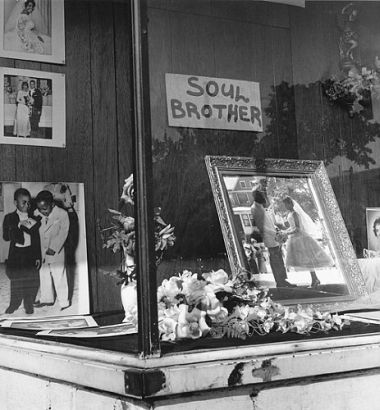
[Buffalo: Lower West Side]
1969-1973
Milton Rogovin
_______________________
from
Sprach ist Namen Scholem
Serge Gavronsky
drunken boat
I.
Hide language in
a name
sacred
or
was it sacr-
ed
poetry in the abyss
fragments
always
spectre haunting
my mouth
Hölderin’s
husky mouth
already the
fear always
dolce Muttersprache
salivating
o that tastes
good tongued
mother
talking whose
birth
keeps on\talking
always
(....)
I spoke then one
language
I wrote was it another?
then a translator?
followed by a
hyphen
cat gut sewing
my wound
silence
we are reduced
to a wound
...(more)
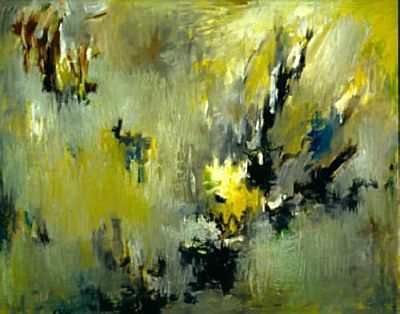
whispering rain
1907
Albert Kotin
b. Aug. 7, 1907
_______________________
From "Bestiary"
Harald Weinrich
Translated from the German by Steven Rendall
The curtain goes up on the reading world
from A to Zoo, emblematic.
Here come the animals, tame and wild:
Already it's problematic.
*
Apes smile at what they see
When standing before mirrors.
People smile or laugh, may be,
looking on their lives in letters.
*
Is reading hard, or is it fun?
Is it grasshopper or ant?
Well, if you must know, son,
Grab your specs and pipe a chant!
...(more)
August 2009: Into The Wild: International Nature Writingthe latest issue of Words Without Borders _______________________
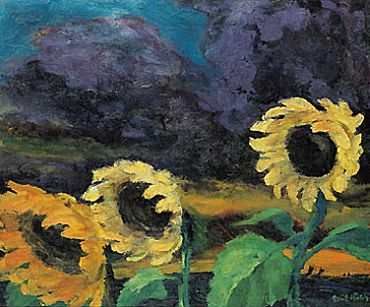
Sunflowers in the Windstorm
Emil Nolde
1943
_______________________
Look, Brother
Tomaž Šalamun
Translated from the Slovenian by Anselm Hollo and the author
I am abandoning iconoclastic levels, I am a tiger
in a heart a seedbud, the soul germinated in you, did she?
anima, brown sun of anterrestrial strata of roofs
immersed shadows, sheep squeezed in shelter
within palms, dramas
within reach of pack smell, among the petty lumber tradesmen
o light, asunder,
eat fruit, peel the splendor of goods
the meadows are lacerated, the gazelles faster
morbidity, dark fingers, coffee's beauty
of ruins, femme, moments of gravitation
look brother, blotting-papers, dirty putrid chalets
he was walking in the land in the year of joy
coming to water, scooping it from the bottom
yielding to the eldest son, to the ship's designers
yielding to beautiful vistas, to the racism of the dream
burning madness of herbage, immanent soldiery
...(more)
Six Poems
Tomaz Salamun
exquisite corpse
Tomaž Šalamun at Poetry International Web
_______________________

Gaza's new mud homes
bbc
.....................................................
Over the Siege
Bryan Finoki
Subtopia
With these story lines it’s all the more interesting to think of this housing not just as autonomous innovative refugee mud brick sheltering (something AFH could certainly appreciate), but as extensions of the tunnels themselves, as architectural by-products, or even another form of economic tunnel products, if you will. It’s fascinating to me that the tunnels even in their destroyed state continue to assist the Gazan economy. Refuge spaces spawning from rooted industries below the radar to provide some of the only protective roofing in the area.
It’s almost as if the tunnels had been turned inside out, sort of poetically unraveled overland as a result of the Israeli assaults, and now offer the dual benefit of both relief housing while also keeping the essential corridors of underground commerce alive.
In some ways it’s just good old-fashioned poetic justice bound with some gritty irony.
And for all Israel does to try and crush them, to expose and bleed them further to surface, their efforts have only shown to have driven the economic tunnels further underground while exposing how the tunnels can also serve the Gazan population in a completely humanitarian way, by being reinvented right there on the Gaza landscape for all to see in the form of shelter; the bowels of the tunnels regurgitated from the earth, reconfigured into neat stacks of the most needed thing of all – new housing, schools, mosques, new spaces of rebound. And so, the epic persistence and quasi-architectural resistance of the tunnels once again yields their amazing blueprints as uprooted spaces edited into fresh new infrastructure now in plain view....(more)
_______________________
Assassinations and Coups
Keeping Track of the Empire's Crimes
William Blum
_______________________
Enculturation 6.2: Image Events
via Philosophy's Other
_______________________
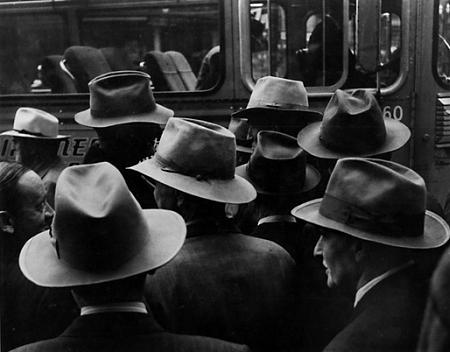
Hats
William Heick
1952 belated happy birthday languagehat
Congratulations and thanks for the past seven years - mw
_______________________
When Poetry Becomes Visual:
Derrida’s Monolingualism of the Other
reviewed by Tom Hibbard
jacket
Collage artists have for a long time been cutting up iconic pictures of fashion-model realism and rearranging the pieces to allow a more forthright representation. The battle against formal constraints making off-limits everything that is substantive for a fulfilling life is what the 20th Century, with 19th Century Victorianism in its wake, is all about. The theme goes back to Dostoyevsky, Freud, the rise of psychology, the beginnings of Modernism, improvised music. But this same theme seems to be welling up in the present hour, crashing on the breakwaters of practicality and politics with all its might, like despairing floods that have washed away petty, money-crazed franchise-economy-sized excuses for levees.
Appearance as form is part of many contemporary discussions. It has to do with religious authority. It has to do with running a national economy. It has to do with destruction of the environment. It has to do with gay marriage. It has to do with language. One piece of writing in particular that takes up directly the notion of form versus the new-world abyss of simultaneous sensory input in a credible, profound way is Jacques Derrida’s book, Monolingualism of the Other or The Prosthesis of Origin.
Though it is for many controversially, forbiddingly abstract in its title, this 93-page tract — which shows Derrida precariously aloft, a not-quite fully recognized philosopher but still an “ivory tower” middle-of-the-roader, no laying-it-on-the-line radical or world-weary novelist — has an aura of summation and momentousness, is truly poetic, truly globally engaged. Brief as it is, it is still complex and fundamental in the ideas that it brings out, incompletely, impressionistically, with room for others to glide along. ...(more)
Monolinguism of the Other or The Prosthesis of OriginJacques Derrida translated by Patrick Mensah pdf
_______________________
El último Lobo
László Krasznahorkai
Translated from the Hungarian by George Szirtes
words without borders
...he muttered to the Hungarian barman in the Sparschwein, and set off down the sticky pavement of the Hauptstrasse trying to accustom himself to the thought that at any moment he could fly off to Extremadura, though he had no idea where "Extremadura" was, having just two acquaintances in Spain, his selfless one-time translator and his selfless one-time publisher, though even they, naturally, had been obliged to pulp his books because they couldn't sell them, as a result of which his connection with them was long lost, that being about the time he lost contact with everyone else, though this remained the one possibility, to write to them and ask them, what was going on? what was this invitation? "believe it or not" and whether it was real at all, this "Extremadura" that had once been what the Romans called Lusitania, so he went to the Telecafe, and there came the answer: yes, Extremadura was the modern Spanish part of the ancient Lusitania, which is to say the province was partly located in modern Portugal, with Andalusia beneath it and Castila y Leon above it, and it was from there the Conquistadores set out but all the same, the ex-translator and ex-publisher asked—and you could sense their astonishment—how was it that it should be precisely him, he who had long been known to carry a vast store of information in his head, that he could be confused about such things, how far had he fallen from his eminence, the message being plain, quite plain from their replies, that this was what they were asking themselves, and, all the same, were asking him, there, in capital letters talking about it, meaning, what the hell would you be doing in Extremadura, because THERE IS NOTHING THERE, it's just an enormous, mercilessly barren, flat place, with a few small hills generally near the border, horribly dry, the hills bare, the earth dried out, with hardly any people since life was as hard as it could be there, serious poverty, an utterly parched place, why the hell go to Extremadura, when you could come and visit us in Barcelona, his two warm-hearted philosophy-loving friends exhorted him .......(more)
_______________________
 1901
Emil Nolde
b. Aug. 7, 1867
_______________________
and surely we shall not continue to be unhappy
we shall be happy
but we shall continue to be ourselves everything continues to be possible
René Char, Pierre Reverdy, Samuel Beckett it is possible isn't it
I love Reverdy for saying yes, though I don't believe it
-
(from "Adieu to Norman, Bon Jour to Joan and Jean-Paul," Frank O’Hara)
posted in a comment to Tom Clark's Reverdy assemblage at Vanitas
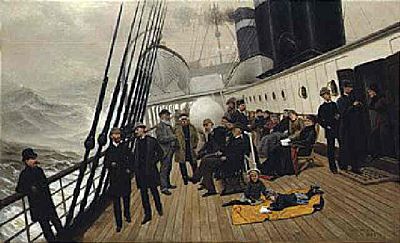
The Channel Crossing
George Hand Wright
b. Aug. 6, 1889 100 Years of Illustration
Paul Giambarba
_______________________
New Iowa
Chris Mansell
footsteps on the head of a ram
....descent
There is no strength from holiness, the fetus in this weather must learn to fend
for itself. The new Buddha will form a line in the air, never to cross. Without death
the breath of gods are little more than the crunching rocks of an exodus. The precise
tracings of a circle that was first formed around the rim of a crest of fire. Shatter the cave and your left with the sounds of dust smashing up against animal skin. Orpheus slain to protect the hour of stillbirth.
trembling before the darker trees, hair spread on the ground. Angels like mucus-covered crows jumping around in the skies. Younger ones yelling in indirect speech about the ground rising, sweat becomes the bodies only defense to the odor of fear. Burn like a direction and separate....(more)
Oarystis, The City of Desires via Robert Chrysler
_______________________
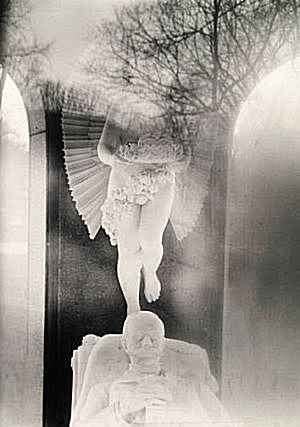
A Vision of Dead Desire
1954
Clarence John Laughlin
1905 - 1985
_______________________
The Head Filled With Beauty
Pierre Reverdy
Translated by Michael Bullock
google books
Again Who
In the night that is falling, that is opened with a key hanging from the tree and creaking, sparkling, turning towards all the horizons and inall the currents - here are vague men because of their backs worn by the forces of time, passing against a background of fog that is settling.
It is drizzling on all the roads that are being obliterated, on the meadows that are slowly changing places, on the woods to deepen the night - nothing remains in the same line.
The black footpath leads me astray through the thickets; the hedge has no more holes stopped with balls of cinders. These grey flags rolled up at each corner, these colours lost in the darkest bands, these imaginary landscapes traversed by a few songs of night birds and suddenly - too close to imagine them possible and present - the movement and the warmth of large beasts - if we are not really lost in the universe and if the aspect of the deep reefs is not reflected in them.
_______________________
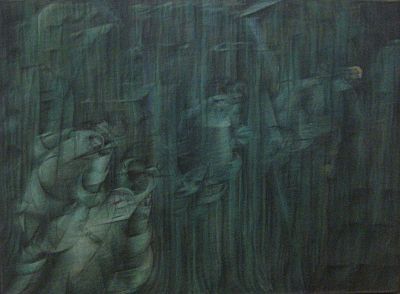
States of Mind III: Those Who Stay
1911
Umberto Boccioni
1882-1916
aka summer of '09
Lanark county
_______________________
"Seven Poems"
Pierre Reverdy
translated by
Kenneth Rexroth
The Same Number
The hardly open eyes
The hand on the other shore
The sky
And everything that happens there
The leaning door
A head sticks out
From the frame
And through the shutters
You can see out
The sun fills everything
But the trees are still green
The falling hour
It gets warmer
And the houses are smaller
The passersby go less quickly
And always look up
The lamp shines on us now
Looking far away
We could see the light
Coming
We were happy
That evening
At the other house where somebody waits for us
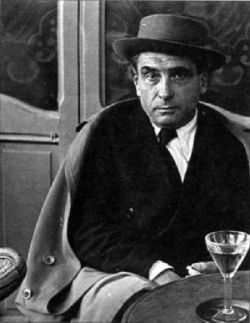
Pierre Reverdy
1889 - 1960
The Cubist Poetry of Pierre Reverdy
Kenneth Rexroth
Bureau of Public Secrets
Eight Poems by Pierre Reverdy
translated by Tom Hibbard
John Ashbery and Ron Padgett on the works of Pierre Reverdy
audio from KCRW's Bookworm _______________________

Prague bridges
found here
_______________________
from
Threshing the Word:
Sappho and a Particle Physics of Language
Meredith Stricker
Ploughshares
What if we could look at language as matter
[as real and outside our imagining as granite or cedar trees]
and move inside words, the way particle physicists break
into atoms with the force of their own energy and light?
To track the intelligent chaos of language by threshing
open the word,
olive pressed against stone
disappears into
its own
wet interior vowels in their syllables
wheat crushed white
as the almond in its green husk.
Delving into the fibers and roots of the word fragment
[Sappho’s emblem, her surviving] first unbinds
the alliterative echo of “fragrant”
[redolent of sunflower pollen,
basil on a white plate, a single dark
crimson rose]
floating free from a solid core of definition, from meaning
one thing alone as a river of other words is loosened
like sodium and chloride molecules
from the simple compound salt.
...(more)
_______________________
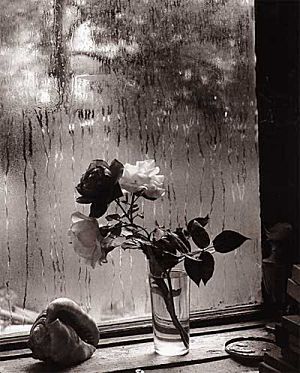
Josef Sudek
_______________________
Facade
Pierre Reverdy
Translated by Tom Hibbard
The hobo strikes the hard sun with his staff
In this place
In front of the door where a furious dog snarls and
bites
The family favorite sleeps
Behind curtains
The shutters close
The unknown of the road that everyone travels
A threatening cry in the night
All the thieves of dreams slink away
They are scattered among a few books
The roads have become safer
And our faces have taken on a pale tranquility
One no longer fears danger and one knows death
In the sun
We imitate people from hot climates
And forget not to trust nature
And the times shed this too-long peace
That looks like the end of the world
We are all part of the source of civilization
One will understand too late the danger of imitation
The strange combat no longer exists
The principle characters are lost
But the closed house is like ourselves
An intimacy that no one knows
Searches outside curiosity
And our hypocrisy
the fear of each other
The dog guards it
—1916
Eight Poems by Pierre Reverdy
Translated by Tom Hibbard
milk magazine
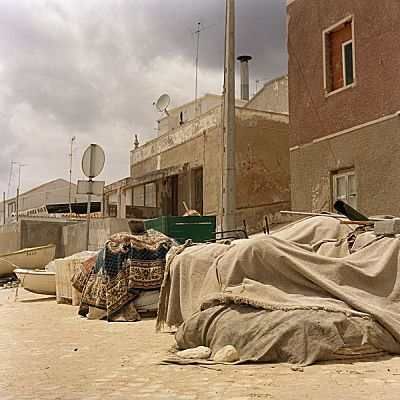
Salema
Caroline de Vries
_______________________
words for what happens
Rod Pederson
- meditation five, in which the desert is taken by the sea
waterward the crossing followed sandprints
windfill glissed a hemstitch tattering robe
and hours daypassed encoiled arose another
dervish did
and mindlost
went the way
the shoreboard lay laptongued and mersome songplashed
hallelujahs forthright aimed upyearning tread one
back the other breaks the dunelock then the newsung
bound
against the faltering
ardent spray
...(more)
ditch
a Canadian online poetry magazine celebrating the non-conforming, the radical, the alternative, the surreal, the avant-garde, the non-linear, the abstract, the experimental.
_______________________

Sonja Skarstedt
1960 - 2009
We have lost someone who contributed so much to poetry in Montreal, with her magazine Zymergy, published between 1987-1990, and later with Empyreal Press, she was a tireless and generous worker for many of us whom she published and many more that she supported in other ways. She was also a great support and friend of Louis Dudek in his final years and published his last books for him. What a loss we have all suffered...
- Stephen Morrissey
via Brian Campbell
.....................................................
Plaza Alexis Nihon
Sonja Skarstedt
—for Louis Dudek
Pews of faces applaud
le roi du souflaki as
solid as a god Dimitri
a spectacle in eggplant
olives and feta
unwraps the essence
of Greek vine leaves
a shriek of zucchini
in hot peanut oil
entrez s'il vous plaît
et mangez chez moi
c'est toujours régal
chez Dimitri!
in his brain a shepherd's bell
is stirring Elysian memories
a rumble from Mount Olympus
pomegranates and titans' graves
so faraway
...(more)
_______________________
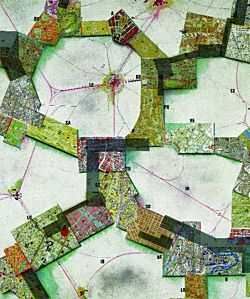
Symbolic Representation of New Babylon
(detail)
Constant
1969
Photo: Victor E. Nieuwenhuys Constant interview
BOMB 91/Spring 2005
New Babylon
Constant’s New Babylon
The Hyper-Architecture of Desire
Mark Wigley
Reviewed by Andy Merrifield
Harvard Design Magazine
_______________________
Brutalism, friend of the Pedestrian
Owen Hatherley
Rather than sharing our streets with cars, we should be building car free streets in the air, from which we can rain down eggs and rotten vegetables on said cars....(more)
_______________________
from Genji Monogatari
Mark Young
III: The Shell of the Locust
Signal bits stored in the
pulsating circular
patterns of the fan blades
determine the relationships
between speech & writing.
Elsewhere, grazed or un-
grazed pasture is immaterial
to the rise of prairie dog
communities & the storage
of words in long-term
memory. She read Derrida—
nothing else to do through
the long twilight hours—
& thought about the
mystical character of the
fetish, a garrulous mute
made from black wool lapt
about with black silk &
tied at the top in a pony-
tail. Semiotics no longer
depends on logic. The only
insecticides which might
make a difference are banned.
...(more)
Moria
volume 11, issues 3 & 4
_______________________

Where the wild things aren't
Detroit's Abandoned Belle Isle Zoo
jdg
Sweet Juniper!
via Plep NY
_______________________
Contemporary Aesthetics
Volume 7 (2009)
including a feature on Aesthetics and Race: New Philosophical Perspectives
_______________________
Open Letters Monthly - August 2009
An Arts and Literature Review
_______________________
Discourse Notebook Archive
an effort (in conjunction with 'The Bernstein Tapes'*) to make available lectures in contemporary continental philosophy.
Kristeva, Badiou, Zizek, Video: from the archives of the European Graduate School,
The Films of Adam Curtis
via Continental Philosophy
_______________________
Of Bricolage
Larval Subjects
Bricolage, as a philosophical “methodology”, does not represent an ad hoc approach to philosophy, but is rather a performative enactment of a set of object-oriented theses. On the one hand, it is a methodology that recognizes situatedness in the world. Ideal Engineering philosophies that present themselves as self-contained systems are simply, as Derrida pointed out in his famous “Structure, Sign, and Play”, disguised works of bricolage. Spinoza, for example, was a bricoleur who drew together elements of the thought of the Stoics, the new physics, perhaps Plotinus, a host of medieval thinkers, Hobbes, and so on. The deductive nature of his system was a structure imposed ex post facto on the bricolage he had performed– and certainly this too had a morphogenetic role –and not something from which the system emerged like a new head from a hydra. On the other hand, bricolage as a methodology is the recognition that every object is an assemblage or that every object is born of other objects that it enlists and exapts in the production of its own endo-consistency.
To criticize a philosophy for drawing concepts from other philosophies, to insist that in borrowing concepts a philosophy must somehow endorse all the elements of the philosophy from which it is drawn, is to dream of being Baron von Münchhausen (the dream of every obsessional) and to ignore the phenomenon of exaptation common throughout the world of biology, technology, and all culture. The relevant question isn’t whether a philosophy remains true to the philosophy from which it lifts, like a pick-pocket, its concepts, but whether in lifting concepts and exapting them, it manages to form an endo-consistency that hangs together, can function, and sustain itself....(more)
_______________________
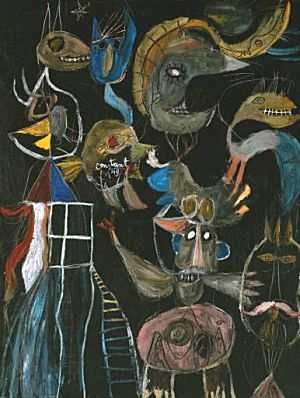
After Us, Liberty
Constant
1949
_______________________
Who John Galt Isn’t
Sam Kean
... at least Karl Marx had the analytical talent to write a non-fictional and occasionally penetrating analysis of the capitalistic worldview. Socialism is largely fantasy, but Galt and his ilk in the gulch are pure, unadulterated fantasy: They appear in a novel. How, how, how can someone condemn socialism as the paragon of a nice-sounding but dangerous policy and yet simultaneously cite what’s more or less an economic Passion Play as the embodiment of a rational, level-headed, natural order? For Christ’s sake, even Alan Greenspan has disabused himself, and no one drank more Rand-flavored Kool-Aid....(more)
_______________________
Consciousness Capitalism: Corporations Are Now After Our Very Beings
Capitalism has raped the resources of the world. Now corporations are left to strip human experience from life, then rent it back to us.
Joe Bageant
For all its pretense and manufactured consent, our government is just a corporate racket now, and probably will remain so from here on out. This is a white people's thing, an Anglo-European tradition. Moreover, we no longer get real dictators such as a Hitler, or a good old bone-gnawing despot like Idi Amin. We get money syndicates in powdered wigs or Seville Row suits, cartels of robber barons and banking racketeers.
The corporate rackets of European white people, especially banking, have a venerable history of sanction, dating back at least to when William the Conqueror granted the corporation of London the rights to handle his English loot.
For all his cruelty (he skinned the people and hung their tanned hides from their own windows, and if that ain't the purest kind of meanness, I don't know what is!) William, just like Allen Greenspan and Bernie Madoff, understood that the real muscle hangs out in the temples of banking and money changing. (....)
Corporatism's rituals are as reverentially and unquestionably observed in daily behavior as those of ancient Egypt's theocracy or the blood sacrifice of the Aztecs. The Aztecs thoroughly believed their world would end if the gods were not fed enough still-beating human hearts. We believe that the world turns on employment figures, stock prices, our jobs, productivity and consumption. Hourly, we receive reports from the media priesthood on the health of an aggregate god known as the economy. The masses pause to listen, then ask inside their heads, "Will my job, my only source of family sustenance, disappear? I must try harder."
And so, fearfully, we render tribute to Moloch in the form of increased toil, more sheaves of what they alone produced (for it is labor that produces all authentic wealth) in the form of bailouts and sons sacrificed on the altar of war.
High and low, we have been transfigured into a society of performers behaving the way we are expected to behave as productive citizens. Production as measured by the bastards. And we cannot expect to find any Gandhis or Simón Bolivars among that high caste. One does not get there by leading salt strikes, nor does one appear in their boardrooms on behalf of the masses wearing beggar's cloth....(more)
_______________________

Waiting for the Past
Texts and Images: ©Dominic Rouse
1:1 photo magazine
I open my sewered mind unguardedly
And rats the size of childhood fears
Rummage through empty cupboards
Lined with the past's unhappy news.
Truth, that bastard of eternity,
Drips from a rusty hanger; mothballed,
Outmoded, death-trapped and creased,
Do-goodingly given to the needy.
...(more)
via blog of still-dancing
_______________________
Out There, in the Far Reaches, Twice in One Day
Robert Gibbons
Out there, in the far reaches, twice in one day, first, under heavy clouds, I wondered if language seeks light, then quickly responded to the wonder: no, language has light inside, just as the body has light inside, the human body like the saxifrage along the path, fragile, but tough enough to crack earth & stones. Clouds suddenly less heavy, suspended in light are light, the immediate past turning right there before my eyes into immediate present. It’s as if walking a dream corridor, as I’ve often done, only this one in real life, where the path offers up what’s there along with that shimmering other where the fox once stood staring you down, no, staring into you....(more)

street of the rolling shutters
Shimada City, Japan
Guido Castagnoli
via Heading East
_______________________
The Busy Heart
Now that we've done our best and worst, and parted,
I would fill my mind with thoughts that will not rend.
(O heart, I do not dare go empty-hearted)
I'll think of Love in books, Love without end;
Women with child, content; and old men sleeping;
And wet strong ploughlands, scarred for certain grain;
And babes that weep, and so forget their weeping;
And the young heavens, forgetful after rain;
And evening hush, broken by homing wings;
And Song's nobility, and Wisdom holy,
That live, we dead. I would think of a thousand things,
Lovely and durable, and taste them slowly,
One after one, like tasting a sweet food.
I have need to busy my heart with quietude.
The Collected Poems of Rupert Brooke
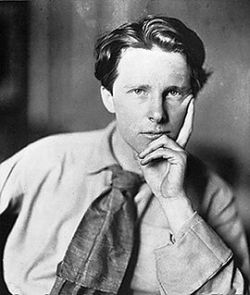
Rupert Brooke
3 August 1887 – 23 April 1915
photo - Sherril Schell
_______________________
Universe
Susan Steinberg
conjunctions
One does not start with mourning doves.
One cannot start with doves surrounding the bedroom.
One starts with the trip to Sausalito, the quick ride over the bridge, the city shrinking in the sideview.
One starts with the trip as the details of the trip are simple: Mexican food, espresso.
The details are simple: houseboats and the theater where one remembered seeing a film on a first date, a blind date, some years back.
The date, himself, one remembered, was beautiful, the night itself, and if one felt to sleep with him on the first date, if one felt to sleep with anyone on a first date, one would have gotten, one would get, one would guess, the second date.
The film was foreign, fine; two perfect people falling in love.
One cannot start with mourning doves surrounding the bedroom, several in windows sitting on branches, making their hollow sound.
One cannot start with doves looking through the windows to where one lay in one’s bed, still, too late to be lying still in one’s bed.
(....)
And when one’s eyes teared up, one politely left one’s friend at the table, one teared politely, outside, in the wind, looking toward the houseboats, feeling half-pathetic, half-heroic.
Which is to say half-oneself, half-someone else.
Once inside, one didn’t explain the events of outside, that while one’s eyes were tearing, while one’s hair was whipping about the way one would imagine, there was a pulling in one’s gut.
One only said one saw the houseboats, a man in a straw hat standing on one, sweeping its floor, and this seemed a metaphor too.
But for what.
One doesn’t know.
Perhaps something about out with the old.
Perhaps something about each man for himself.
Perhaps something about something about that.
...(more)
_______________________

The willow village Iza
Anna Voitenko
blog of still-dancing
Anna Voitenko
_______________________
Bits
Sven Birkerts
agni
Schimmelpenninck: Made in Holland. A dented little tin taken down from the cluttered top shelf of the bookcase behind my attic desk, a bookcase that has become one of my default reliquaries, kind of like the mesh sieve in the kitchen drain that catches everything left from the wash-up of a family meal, except that the sieve then gets emptied into the kitchen trash while the sentimental refuse of living just accumulates. I picked it up in the spirit of ‘you have to start somewhere,’ but also with a certain confidence. I am, after all, the writing teacher who quotes to his students the line from Flaubert: “Anything becomes interesting if you look at it long enough.” And I do believe it, interest being the discovery of connections that feel as if they are leading somewhere, marking a path. It is the product of attention. Look! Look closer! What do you see? Start with the eye and see what happens. Pray, as Lowell did, for the grace of accuracy.
Schimmelpenninck. Well, the little tin is there to be looked at, but it would be nothing to me—sentimentally, associatively—if it weren’t for the sound and look of that word. A word that means absolutely nothing to me. A brand of cigarillos, yes. A little choo-choo train of m’s and n’s. Just above it on the tin a small inset image of a high-browed and peruked gentleman with a stiff collar and a formal-looking flow of white cloth, almost a bib, where a tie would ordinarily go. Herr Schimmelpenninck? Or is this the king of Holland offering his imprimatur on the product? It could just as well be Goethe, there’s that same projection of entitled nobility. Doesn’t matter. But the whole effect, and probably the reason I kept the thing, is very haute-European. And I know where this thread—it is fine and twisty—leads. ...(more)
_______________________

Feral Houses
James D. Griffioen
via Infocult

On The Ground
Galina Lukyanova
_______________________
Dick-Disneyland-Dysphoria-Desertification
k-punk
Dick's Time Out Of Joint, published in 1959, two years after the first Disneyland park opened, is remarkable for the way in which it treats literary realism as a kind of Disneyfication. In a classic moment of Dick ontological vertigo, the novel's painstakingly described small town is revealed, in the end, to be an intricate system of pasteboard frontages, hypnotic suggestions and negative hallucinations. The pay-off can just as easily be read in terms of critical metafiction as science fiction, for what is any setting in realist fiction if not the same kind of system? How is any 'reality effect' achieved except by authors using techniques such as these?
In the novel, the whole small town scenario is constructed as a pretext, a comfortable setting in which the protagonist can undertake high pressure military work for the goverment while thinking that he is doing a trivial newspaper contest. Yet it is clear that the science fictional elements were for Dick the pretext that allowed him to write successfully in a naturalistic way about 50s America. They were the enframing devices that enabled Time Out Of Joint to succeed where Dick's purely realist fiction failed. (....)
What is remarkable is the way in which Dick was capable, in 1959, of already identifying those stereotypical features of the American 50s which would come to define the decade in retrospect. It is not Dick's skill in projecting into the future that is to be admired - the novel's 1997 is confected out of generic SF tropes, far less convincing than the ostensibly fake fifties world it embeds - but rather his capacity to imagine how the future would see the 50s. It is the 50s already envisaged as a themepark; an anticipated reconstruction. Dick's simulated smalltown is not enkitsched as Disney's memories of his early 20th century were, but precisely given what Jameson calls the "cabbage stink" of naturalism: "the misery of happiness, ... of Marcuse's false happpiness, the gratifications of the new car, the TV dinner and your favourite programme on the sofa - which are now themselves secretly a misery, an unhappiness that doesn't know its name, that has no way of telling itself apart from genuine satisfaction and fulfilment since it has presumably never encountered this last." In this lukewarm world, ambient dysphoria hides in plain view, a hazy malaise given off by the refrigerators, television sets and other consumer durables....(more)
_______________________
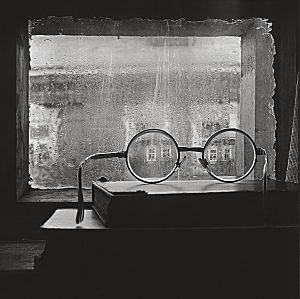
Galina Lukyanova
_______________________
Delivering Newspapers
Bei Dao
translated by Eliot Weinberger and Iona Man-Cheong
Who believes in the mask’s weeping?
who believes in the weeping nation?
the nation has lost its memory
memory goes as far as this morning
the newspaper boy sets out in the morning
all over town the sound of a desolate trumpet
is it your bad omen or mine?
vegetables with fragile nerves
peasants plant their hands in the ground
longing for the gold of a good harvest
politicians sprinkle pepper
on their own tongues
and a stand of birches in the midst of a debate:
whether to sacrifice themselves for art or doors
this public morning
created by a paperboy
revolution sweeps past the corner
he’s fast asleep Thirteen poems
Bei Dao
translated by Eliot Weinberger and Iona Man-Cheong
Jacket 14
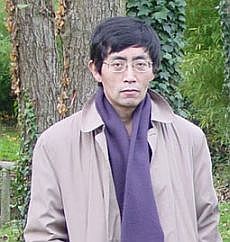
Bei Dao
b. August 2, 1949
The August Sleepwalker
Bei Dao
translated by Bonnie S. McDougall
google books
Bei Dao
Spring/Summer 2006— Chinese Feature
drunken boat
.....................................................
Alphabets Upside-down: the voice of Bei Dao
Lucas Klein
rain taxi
Unreal Images: [pdf]
Bei Dao’s Dialogue with the Real
Dian Li
Abstract
Bei Dao’s hermitic style of poetry has been baffling his critics ever since he
started writing. While his earlier “Misty” poetry met with strong resistance
from official Chinese critics, his continuing insistence on fragmented syntax
and disjunctive imagery, while writing in exile, has earned him a few
detractors in the West. Does Bei Dao resist reading? Can one make sense of
his poetry? What is the relationship between meaning and interpretative
certitude? These are some of the questions that the paper tries to address. With
a careful reading of his selected poems, I will show how Bei Dao privileges
ambiguity and uncertainty by focusing on the construction of unreal images,
images that strikingly defy conventional rationality because they shy away
from an expected correspondence to real and common life events. This
“unreal” imagery, whose power comes from an imaginative reordering of the
real, forms a key aspect of Bei Dao’s poetics
Concentric: Literary and Cultural StudiesJanuary 2006
_______________________
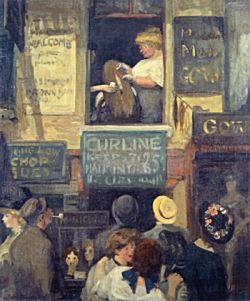
Hairdresser's Window
John Sloan
1907
_______________________
The violence of participation
Spatial practices beyond models of consensus
Markus Miessen
eurozine
Participation is war. Any form of participation is already a form of conflict. In war, enemy and adversary usually hold territory which they can gain or lose, while each has a spokesperson or authority that can govern, submit or collapse. In order to participate in any environment or given situation, one needs to understand the forces of conflict that act upon that environment. In physics, a spatial vector is a concept described by scale and direction; in a field of forces, it is the individual vectors that participate in its becoming. However, if one wants to participate in any given force field, it is crucial to identify the conflicting forces at play. Participation is often understood as a means of becoming part of something through pro-active contribution and the occupation of a particular role. However, it seems that this role is rarely understood as a critical platform of engagement, but rather based on romantic conceptions of harmony and solidarity. In this context, I would like to promote an understanding of conflictual participation, one that acts as an uninvited irritant, a forced entry into fields of knowledge that could arguably benefit from spatial thinking....(more)
_______________________
The Bastards Never Die
A Short History of Why We Eat Oil, Can't Smoke Pot and Assault Weapons Are So Expensive in Our Hour of Need ...
Joe Bageant
(With Running Commentary by Screaming Man)
The bastards. Why have they lasted this long? Purely on their own merits, most American corporations probably would not have survived the 1930s. By then our wildly fluctuating economy was already demonstrating the folly of overly concentrated capital and power. What was needed, said the big players who'd wrecked the economy with their uncontrolled speculation and greed, was, lo and beshit, a controlled economy! One even more controlled by corporations. Problem was, the only entity capable of such control was the government. And unfortunately, the Constitution of the United States was founded on a separation of business and state to the same degree as that of church and state.
If the bastards were to run the economy, if Americans were going to be pistol whipped down the road to "prosperity through unprecedented consumption," then government authority by Constitutional law would be necessary. As a 1937 shareholder's report of the E.I. DuPont Company "the revenue-raising power of government [taxation] must be converted into "an instrument for forcing acceptance of sudden new ideas" and a "social reorganization." Uh oh! Just whose sudden new ideas? And what kind of social reorganization?
The report stated bluntly that to realize further extensive profit from its wartime investments, the U.S. government "must be the primary tool." While their plans to use the government were put into the shareholder's report, they were never publicly discussed. ...(more)
_______________________
"Walking across the city. In the gaps left open by the masses of cars there are still a few isolated individuals, ashen pale or flushed, in incompatible states, and these people have subjected themselves to politics or world history, and amid the technological din they go around posing (like the figures shown in architectural drawings) at the foot of gigantic buildings, which are the essential while they are mere incidentals; moving through this catastrophe as through an underground hangar, I try to breathe everything in through my eyes, to preserve within me the forlorness of these people."
-
Peter Handke, The Weight of the World, translated by Ralph Manheim
_______________________
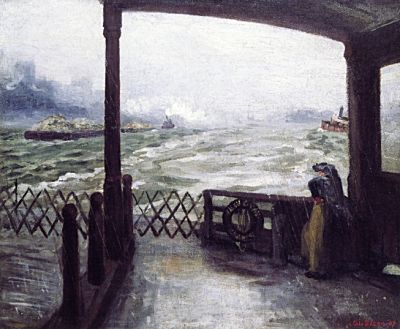
Wake of the Ferry
1907
John Sloan
b. August 2, 1871
_______________________
Reading of History
Bei Dao
Translation by Tao Naikan and Simon Patton
As plum flowers revolt, the hostile dews
Safeguard the darkness engraved by the midday sword
The revolution will start next morning
The plaint of widows is like a wolf pack racing across the frozen plain
Due to a prophecy, ancestors retreat into
That river where faith argues hectically with desire
There is no end, there is only a vortical recluse
Experiencing another meditative tranquillity
Climbing high to behold sunset over the throne
As civilisation drifts off with the flute music in the empty valley
Seasons stand up from the debris and
Fruits creep over the walls to chase tomorrow.
Bei Dao at the Poetry International Web
_______________________
The crisis consists precisely in the fact that the old is dying and the new cannot be born; in this interregnum a great variety of morbid symptoms appear.
- Antoni Gramsci - Selections from the Prison Notebooks (1971)
courtesy of Thivai Abhor
|

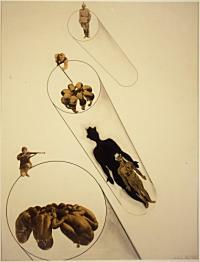
 Janus Head
Janus Head

 The Age of Briggs & Stratton
The Age of Briggs & Stratton

















































